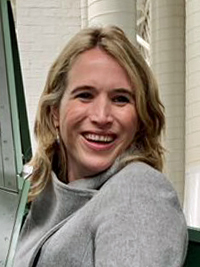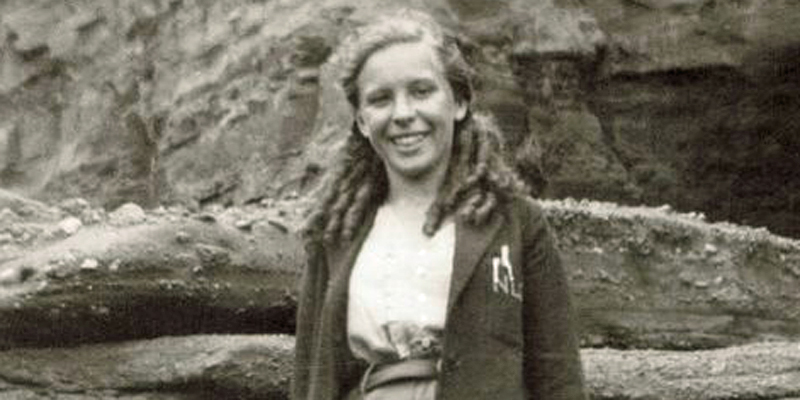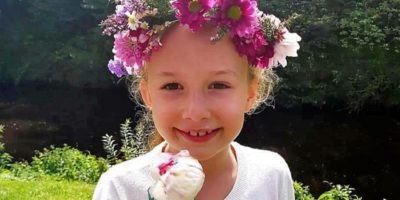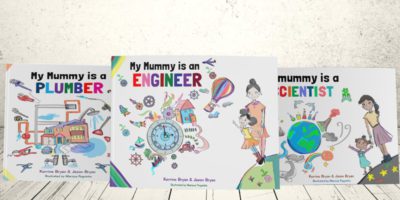Felicity Baker is a BBC News journalist and producer, and the granddaughter of Hazel Hill. Hazel helped her father, Captain Fred Hill, put eight guns on the Spitfires and Hurricanes in the run-up to World War II with her calculations. 13-year old Hazel’s calculations helped Britain win the Battle of Britain in 1940.

“I am proud that my grandmother refused to conform with what society expected. Not only was she good at maths, but she became a doctor at a time when few doctors were women and went on to become a leading hospital consultant.”
Not knowing exactly what my grandmother had done
I’ve worked as a BBC News journalist for 11 years. I spent five years working in the Westminster newsroom – and since 2015 I’ve worked as a producer on the BBC News Channel and the One O’Clock News.
I always knew my grandmother had done some mathematical work on the guns on the Spitfires and Hurricanes in the run-up to World War II and when I joined the BBC it was in the back of my mind that I should investigate what her contribution had actually been.
But it was only when my family started looking into the story in detail and passed on their research to me that we realised how important her work had been.
The girl who helped win the Battle of Britain
Hazel’s father, Captain Fred Hill (my great grandfather), was a scientific officer in the Air Ministry. In the mid-1930s they put forward a specification for the new generation of fighter planes, Spitfires and Hurricanes.
The plan was for the planes to have four guns, which was a huge step up from the biplanes of the First World War, which typically carried only one or two. But Fred had analysed firing data and realised that four guns would not be enough to bring down the increasing well-armoured German planes.
He faced stiff opposition from his superiors at the Air Ministry – the idea of eight guns was seen as staggering, and many felt they would weigh down the new planes and it would be impossible to fit them on. But Fred was convinced he was right, so he went home armed with one off the latest calculating machines and the latest gun firing analysis – and asked his daughter Hazel, who was a 13-year-old schoolgirl, to help him prove his case.
Together they worked through the night on complex calculations which proved that each plane would need to carry eight guns, firing at least 1,000 rounds a minute in order to bring down the German planes.
Fred used Hazel’s calculations to create two graphs which he presented to the Air Ministry at a crucial meeting on 19th July 1934. As a result, the plane specifications for the Spitfires and Hurricanes were changed from four to eight guns.
Six years later during the Battle of Britain, eight guns was only just enough for us to win. If we’d gone with four, or even six we would have likely lost the battle.
How Hazel’s contribution was recognised
At the time my grandmother’s contribution wasn’t widely known about – Fred Hill told only his superior officer at the Air Ministry (Claude Hilton Keith) before that crucial meeting on 19th July 1934. But C.H. Keith documented her contribution in his memoirs, which were later published in 1946, and in private correspondence with Fred.
Hazel also saw the first prototype Spitfire on display at the Hendon Air show in June 1936. As a thank you for her work she was given permission to sit in the cockpit of the new plane. It wasn’t until the work done by Fred Hill was released by the National Archives though that the family were able to piece together just how important her contribution had been.
A prestigious career in medicine
During the war, my grandmother joined the Royal Army Medical Corp where she treated soldiers who were wounded in the Blitz and fighting overseas.
She eventually married one of the soldiers she’d nursed back to health, and they moved to Staffordshire where she became a GP.
She went on to become a child psychiatrist, doing pioneering work in school phobia, anorexia and autism. She was hugely proud of her medical career and would definitely want to be remembered for that – but I think history will remember her for this.
A little girl who just helped her father
I remember interviewing my grandmother when I was younger for a school history project where you had to find out what your grandparents did during the war.

I remember her telling me she’d done “the maths behind the guns on the Spitfires” but I never really understood what that meant – and I never questioned her in more detail on what her contribution had been.
It was something she spoke about, but she was very modest about it – in her eyes, she’d simply helped her father out with mathematical calculations when he asked. I remember her being incredibly proud of her father, and she always spoke highly of the work he did during both World Wars.
I was always very inspired by her stories – and by the fact she combined a hugely busy career with bringing up a large family. As I’ve gone through my life I often find myself thinking about what she would do in my position, and I try to channel that. If I can achieve a fraction of what she did in my life, I’d be happy.

It’s been really amazing to see the reaction from people once the story was out in the public domain. Having the RAF publicly recognise her work was very surreal, but I never expected the story to resonate with so many other people.
I spent a lot of my school holidays with Hazel when I was growing up and I always knew what a special woman she was, but to see people who never knew her say the same has been quite overwhelming.
Girls CAN do maths
We are all individuals, with our own strengths and enthusiasms, but society seems to want us to conform with stereotypes. I am extremely proud that my grandmother refused to conform with what society expected. Not only was she good at maths, but she became a doctor at a time when few doctors were women and went on to become a leading hospital consultant.
From my personal experience, I feel that sometimes girls can doubt their own abilities and perhaps don’t push themselves forward enough. I hope my grandmother’s story can serve to inspire young girls and remind them that their age and sex has no bearing on what they can achieve in life. We really can change the world!






